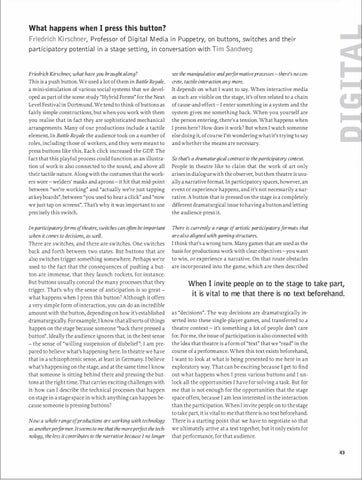W hat hap p e n s w h e n I p ress t h i s b utton ? Friedrich Kirschner, P rofess o r of D i g i ta l Med i a i n P u p petry, o n b utto ns, switches a n d th e i r p a rti c i pato ry potenti a l i n a stage setti n g , i n co nve rsati o n with Tim Sandweg
Friedrich Kirschner, what have you brought along? This is a push button. We used a lot of them in Battle Royale,
see the manipulative and performative processes - there's no con crete, tactile interaction any more.
a mini-simulation of various social systems that we devel
It depends on what I want to say. When interactive media
oped as part of the scene study "Hybrid Forms" for the Next
as such are visible on the stage, it's often related to a chain
Level Festival in Dortmund. We tend to think of buttons as
of cause-and-effect - I enter something in a system and the
fairly simple constructions, but when you work with them
system gives me something back. When you yourself are
you realise that in fact they are sophisticated mechanical
the person entering, there's a tension. What happens when
arrangements. Many of our productions include a tactile
I press here? How does it work? But when I watch someone
element. In Battle Royale the audience took on a number of
else doing it, of course I'm wondering what it's trying to say
roles, including those of workers, and they were meant to
and whether the means are necessary.
press buttons like this. Each click increased the GDP. The fact that this playful process could function as an illustra
So that's a dramaturgical contrast to the participatory context.
tion of work is also connected to the sound, and above all
People in theatre like to claim that the work of art only
their tactile nature. Along with the costumes that the work
arises in dialogue with the observer, but then theatre is usu
ers wore - welders' masks and aprons - it hit that mid-point
ally a narrative format. In participatory spaces, however, an
between "we're working" and "actually we're just tapping
event or experience happens, and it's not necessarily a nar
at keyboards", between "you used to hear a click" and "now
rative. A button that is pressed on the stage is a completely
we just tap on screens". That's why it was important to use
different dramaturgical issue to having a button and letting
precisely this switch.
the audience press it.
In participatoryforms oftheatre, switches can often be important when it comes to decisions, as well.
There is currently a range of artistic participatory formats that are also aligned with gaming structures.
There are switches, and there are switches. One switches
I think that's a wrong turn. Many games that are used as the
back and forth between two states. But buttons that are
basis for productions work with clear objectives - you want
also switches trigger something somewhere. Perhaps we're
to win, or experience a narrative. On that route obstacles
used to the fact that the consequences of pushing a but
are incorporated into the game, which are then described
ton are immense, that they launch rockets, for instance. But buttons usually conceal the many processes that they trigger. That's why the sense of anticipation is so great what happens when I press this button? Although it offers
W hen I i nv i te peo p l e on to the stage to take part, i t is v ital to me that there is no text befo rehand.
a very simple form of interaction, you can do an incredible amount with the button, depending on how it's established
a s "decisions". The way decisions are dramaturgically in
dramaturgically. For example, I know that all sorts of things
serted into these single-player games, and transferred to a
happen on the stage because someone "back there pressed a
theatre context - it's something a lot of people don't care
button". Ideally the audience ignores that, in the best sense
for. For me, the issue of participation is also connected with
- the sense of "willing suspension of disbelief"; I am pre
the idea that theatre is a form of "text" that we "read" in the
pared to believe what's happening here. In theatre we have
course of a performance. When this text exists beforehand,
that in a schizophrenic sense, at least in Germany. I believe
I want to look at what is being presented to me here in an
what's happening on the stage, and at the same time I know
exploratory way. That can be exciting because I get to find
that someone is sitting behind there and pressing the but
out what happens when I press various buttons and I un
tons at the right time. That carries exciting challenges with
lock all the opportunities I have for solving a task. But for
it: how can I describe the technical processes that happen
me that is not enough for the opportunities that the stage
on stage in a stage space in which anything can happen be
space offers, because I am less interested in the interaction
cause someone is pressing buttons?
than the participation. When I invite people on to the stage to take part, it is vital to me that there is no text beforehand.
Now a whole range ofproductions are working with technology as another performer. It seems to me that the more perfect the technology, the less it contributes to the narrative because I no longer
There is a starting point that we have to negotiate so that we ultimately arrive at a text together, but it only exists for that performance, for that audience. 43



